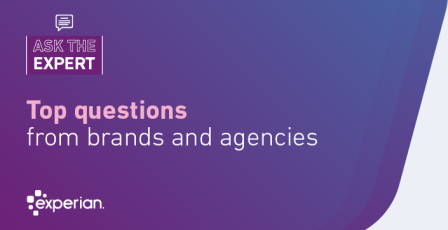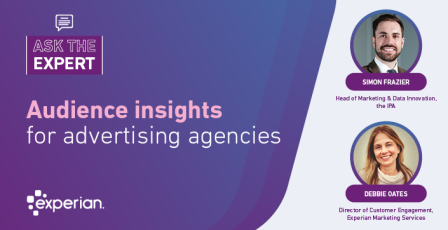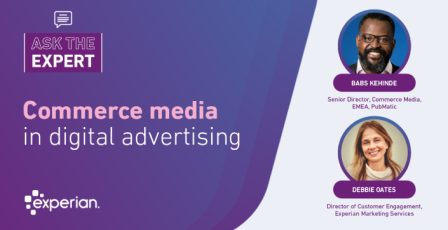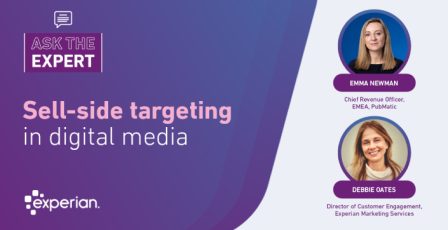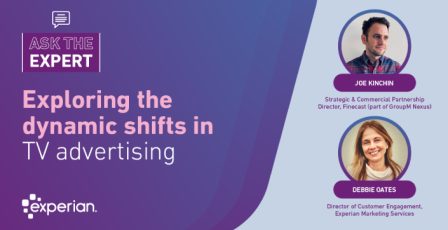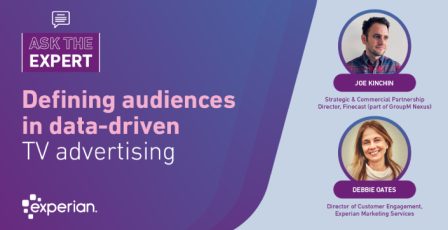Ask the Expert: A publisher perspective with the AOP
Ask the Expert: A Q&A series with AdTech and data intelligence experts
Welcome to our latest episode of “Ask the Expert,” where we delve into the dynamic world of online publishing with Experian’s Danny Holmes and Richard Reeves, CEO of the Association of Online Publishers (AOP).
In this insightful interview, Richard shares his expertise on the evolving landscape of digital publishing, the challenges and opportunities faced by publishers, and the critical role of privacy and data management in today’s digital age.
The role and mission of AOP
Richard begins by introducing the AOP, an organisation founded in 2002 to represent the interests of publishers who create original quality content online. Unlike other trade associations, AOP encompasses a broad spectrum of publishers, including news, consumer, specialist, B2B, broadcast, and pure play. The AOP’s mission is to support the wider digital agenda through education, knowledge sharing, and fostering innovation within the publishing community.
Impact of cookie deprecation
One of the major topics discussed is the impact of cookie deprecation on publishers. Richard explains how publishers have been preparing for the deprecation of third-party cookies and the importance of Google’s user choice mechanism. He emphasises the need for clarity and timely implementation to avoid overreliance on outdated ID technologies and to foster the development of alternative solutions.
Privacy and consumer trust
Privacy is a paramount concern in the digital publishing world. Richard highlights the importance of respecting consumer privacy and the role of publishers in articulating privacy policies to their audiences. He discusses the balance between regulatory compliance and the need for essential cookies for measurement and brand safety, advocating for a future where ID-less solutions can effectively support advertising and targeting.
Diversification and revenue streams
The interview also explores the diversification of revenue streams for publishers. Richard notes the decline in traditional revenue sources like display and desktop advertising, and the rise of alternative streams such as subscriptions, video, and audio content. He underscores the importance of multi-platform solutions that combine various marketing and advertising strategies to sustain and grow publisher businesses.
Insights and data utilisation
Richard delves into the significance of data and insights in the publishing industry. He explains how publishers are leveraging data to better understand their audiences, enhance advertising effectiveness, and drive innovation. The conversation touches on the challenges of measuring digital advertising performance and the need for standardized metrics to ensure consistency and value across the industry.
This episode of “Ask the Expert” is a must-watch for anyone involved in the digital publishing industry. Whether you’re a publisher, advertiser, or simply interested in the future of online content, Richard Reeves provides valuable insights into the current state and future direction of the industry. Here are a few reasons why you should tune in:
Expert insights
Gain a deeper understanding of the challenges and opportunities in digital publishing from a seasoned industry leader.
Privacy and compliance
Learn about the evolving landscape of privacy regulations and how publishers can navigate these changes while maintaining consumer trust.
Innovative strategies
Discover how publishers are diversifying their revenue streams and leveraging data to stay ahead in a competitive market.
Future trends
Get a glimpse into the future of digital advertising and the role of alternative technologies in a post-cookie world.
Proven success with publishers
The first step is to perform a match test using your first-party data to see the overlap with our data and therefore determine potential addressability levels by leveraging Consumer Sync. This can be achieved with IP addresses, HEMs (Hashed Emails), MAIDs (Mobile Advertising Identifier) or a variety of partner IDs. To initiate the match test, we will either place a tag on your digital properties or set up a data feed to connect your first-party data to Consumer Sync.
We have run several tests over the last 3 months and match rates have ranged from 50% to 89%. A test conducted for a major broadcaster achieved a 70% match rate using IP addresses from anonymous visitors, indicating that further collaboration with us could significantly enhance audience extension and data enrichment opportunities.
While first-party data serves as the foundation for successful monetisation, its true value is realised when it is combined with the broader context that third-party data provides. This enriched approach not only drives more effective monetisation strategies but also equips publishers to succeed in a fast-paced and competitive environment.
Ready to enrich your data strategy?
Claim your free test of our advanced digital linkage solution, Consumer Sync.
Claim free testHello everyone and welcome to Ask the Expert. We’ve got here today, Richard Rees from the AOP. Here to talk about exactly what the ATP do, how they support publishers and what the state of, publishing world looks like today.
So. Hello, Rich, and welcome. Hi. Thank you for having me.
Which we’ll just kick off with, with, who you are and what the AOP do represent. Yes, sure. AOP, stands for Association and Online Publishers.
I run the AOP and the AP was founded in 2002 simply to represent the interests of publishers who were creators of original quality content online.
And online is the key differentiator here.
The other differentiator, if you like, is that unlike other trade associations, we’re a very broad church.
Within our community, we have news and consumer, we have specialist publishers, B2B broadcast and pure play.
And, the point of difference there really is, is about how we support the wider digital agenda.
As a trade body, the benefits, that we provide specifically to our members, are fostered around a program, of, education.
Sharing knowledge, insights and information.
Okay, great. That’s, a great overview, Richard, of the app and how you, support publishers.
In terms of the cookie deprecation, which has been a big talking point in the industry for many years, Google recently announced they will give users more choice as opposed to complete copy cookie, deprecation. What’s your view on the impact here to publishers? And really, does it change anything?
Think I would start by saying that such have been the preparations by publishers for what was believed to be the deprecation of third party cookies.
I think publishers are in a relatively good place, to be able to, leverage what will now probably be a low cookie ecosystem.
Publishers and frustrations will grow in the absence of clarity and any delays.
And by that, what I mean specifically is that, Google’s announcement, is sort of predicated on them creating the user choice mechanism within the, within the browser. Now, it’s very important that at the earliest possible opportunity, we have clarity about how that user choice mechanism will be applied and will work. And also, and I would like to believe, because, you know, the time involved with what was originally intended, surely, now reverting simply to a user choice mechanism, there shouldn’t be.
And I would encourage them to avoid any delay in that implementation. And I think delays to that implementation where, where frustrations will grow for publishers who have vested a lot of time and energy and resource into being prepared for the deprecation of third party cookies. The frustration will be, if that continues to dare I suggest, enable or encourage an overreliance on IDs, the previously existed and is very much a world we certainly as publishers would like to move away from.
And I think, that clarity will hopefully, reduce any overreliance on IDs and also foster the opportunity for alternative technologies to, to evolve, of which, you know, a number of publishers will be working with such propositions. But there are concerns that there are concerns. And if I can, I’ll touch on one, which is the interoperability. I think the if you look at it from a DSPs perspective and the way our industry operates, logic is currently set to, to identify signals from, from IDs.
Yeah.
If we’re to evolve the opportunity around alternative technologies, one of the challenges at the moment is that, DSPs will, ignore signals from ID less technologies. There is no value for them. It’s valueless. Now, I think it’s really important that if Google are trying to evolve an ecosystem where there is a significantly reduced dependency on IDs, then, they need to be able to provide that clarity to support the changes that will need to occur within the logic to ensure that we are able to identify risk signals from alternate technologies that are ideal for us.
And I think one way in which Google, absolutely need to, to, to apply themselves, to ensure this is to make sure that through their own platforms like DV 360, they support ID solutions that are not just their own. And I think that will that will, will foster a real, energy around the application and use of alternate technologies solutions and hopefully remove, non-essential ideas from our ecosystem.
Okay, great. Well, I mean, we look at what you just said there in terms of the essential IDs, and we look at the kind of the role that third party cookies have been playing for now. And I don’t want to need to label the point or want to leave the point
In terms of the role they’ve actually played, what’s your view on the usefulness of that?
Technology and, and I ad tech in particular,
Has enabled publishers to monetize what they do. Yeah. And so they play an important role.
Cookies that are essential cookies. And I guess it depends who you’re talking to by what you can define as essential.
But measurement is a massively important part of any advertising activity. The advertiser has a right to know whether their ads have been delivered, whether they have been successful, whether they can attribute that campaign to, the effectiveness of what was intended or that marketing strategy, I suppose that, also what we’ve seen over the last, say, ten years is an increased expectation around safe placement of those advertising messages.
So brand safety has become a very important thing. It’s a it’s been the bane of publishers lives, because publishers would often argue that the tools that have been utilized to provide brand safety were either not being utilized appropriately and therefore perfectly. Sound and valuable environments were being blocked from being advertised. And by those technologies, or some would suggest that those technologies are not necessarily, fit for purpose.
Yeah. But when I talk either way, and you could argue either way, they still provide value in the ecosystem and they provide some maturity to that advertiser.
Part of what we do is obviously on behalf of publishers is to champion their interest to not only the wider industry and other communities, but to the regulator of the ICO and the advent of GDPR.
And the requirement for privacy compliance,
Has meant that there is sometimes a conflict between perhaps the regulators understanding of third party cookies that might have value, and, and those that are effectively what the ICO is trying to regulate for, which is that, that that invasion of people’s privacy.
So they understand there’s a balance. So in a way, you know, we’re still in the education process where cookies are a concern. But I think if we are going to an idealist future, then we will have better understanding and application of cookies that are essential.
And hopefully, in terms of advertising, targeting and transactions will be able to do that with ID less solutions. Yeah, okay.
Obviously consumer privacy is paramount today. I’m interested in your view on what that means to the consumer, what that means to the publisher
Privacy is very important. Yeah. Massively important. And, you know, the law is clear and publishes a clear around the expectations.
Through our engagement, positive engagement with the ICO, we seek greater clarity around how the law could be applied in the cases and just about interest and so forth around essential data, or essential measurement.
But, no, the publishers are incredibly, sincere in their application of respecting that law and providing, privacy compliant, proposition to that user. I think an important point for publishers is that, we’re concerned that
The dialog around privacy, it could potentially be controlled by browsers. And I think it’s a very important role that publishers play in being able to articulate, the privacy, piece to consumers.
And I, you know, I’m keen to see that publishers are still very much a part of the privacy dialog. That is helps the consumer, but no publishers fully uphold those privacy standards.
So if publishers look to set a strategy that might be contextual versus a kind of ID based or versus any of the other strategies,
Your what would you say to publishers now in how they should consider that a future proof of strategy? Yeah. Again, another really good question. I think four years ago, with the deprecation of the cookie conversation began, you would hear a lot of publishers saying that the that, well, we’ll be delighted to see the back of cookies, but in simple terms, there is not enough of the contextual inventory to be able to monetize and sustain businesses through advertising.
Yeah.
What we’ve also seen, however, is a well, through insights, innovation and experimentation and a very, a very different approach from publishers. And I’m sure we’ll talk more about this, but what I mean by different is that,
Ten years ago it was all about the advertising. Then it was understanding the need to reduce that reliance and look at other, more obvious monetization strategies.
And actually, it’s very interesting to see there’s continued declines around certain, revenue. So display and desktop. Yeah. But you see obvious decline. However, there has been a massive growth in other revenue streams such as subscription owned video or audio and so forth. Yeah. So so these things balance out. But what we’ve seen consistent growth in and to your specific point is what we call multi-platform solutions.
So that is a mix of different aspects, of, of marketing and advertising solutions that publishers are able to offer both online, offline and across different platforms, across different devices and so forth. So contextual. Going back to the point, from an ICO perspective, that was one of those conversations where we’ve had to say to the ICAO, in the absence of any personal information, we still need to for people to be interested in buying contextual ad solutions, we still need to be able to apply cookies for the campaign measurement, verification and brand safety base.
And that’s again where there’s been education with the idea that that the recognition and understanding, of course, you know, if there’s no personal information involved, then to some degree, one could apply legitimate interest to ensure that that kind of contextual advertising is applied. The other important thing in contextual advertising is that 2 or 3 years ago, we would see people, intermediaries within third parties within the ecosystem looking to make available to demand side, contextual audience segments, which were aggregated across multiple publishers.
Now, again, you know, we were quite public about, and published an open letter expressing our concerns around this practice because in that instance, it was often the organizations that were, if you like, allowed to, to, scan across your site for a given purpose, typically brand safety. But they were taking that metadata, and, the page of text information and repurposing it to make available for their own commercial gain within the demand side.
And obviously there were frustrations from, from publishers because this was being done without license and agreement.
So you talked about kind of diversification, right. And so when we when we say reader revenues, can you explain what reader revenues means and what interesting things you’ve seen in this, in this area?
In most instances, a publisher probably would define the reader revenue opportunities, everything excluding advertising. Yeah.
Data has become such a massive piece for publishers. You know, we we five years ago run a cycle with digital first. You know, you have the majority of publishers talking about how their data first, and I’m sure we could go into that more.
But in terms of the context of your question, the, the organized that there was a presentation we had at one of our crunch forums about two years ago, and it was there were two, two really good examples 2 or 3 years ago, people that were really ahead of the curve. One was the independent, the other was immediate media.
And they came within these forums that we we’ve provided to members to talk about their learnings, around, rate revenues and the use of data and what, what they ascertained was the fact that, if, if one, you know, typical media organizations back a day in the old days, the, the sales team was the ones that were rewarded, they were incentivized, you know, they that there was the opportunity to make more money if you sold more ads and you’d have other aspects of the business.
So I don’t know whether it be marketing or editing or whether those incentives didn’t exist. So I think organizations have now sort of align the incentives. So there is a collective feeling that we are all in this together and saying take. And one of the ways in which they’ve done that is how they’ve evolved the use of data insights, so that editorially, from a commerce point of view, from a advertising point of view, whatever your discipline or your role function within the media owner is, you understand why your inputs matter into that data.
Them. So whether it’s somebody who wants a newsletter about wines or whether it’s somebody who wants bulletins around city share prices, so there are a million functions.
Yeah, the publishers can provide where people are willing to pay for that provision because it has value. But data and those insights allow you to identify those opportunities, those audiences and the value against that. Yeah. Well, I think that segues nicely into insights.
You know, what are the main challenges or gaps that you think are exist right now for insight? For publishers, insights for me on a simple level, is actually about the information that publishers have learned to mine that better informs that innovation to somebody like you insights is an aspect of that which is about helping publishers in one particular conversation, the advertiser conversation, enrich and provide and present that data in such a way that makes it a compelling proposition to that advertiser.
I think publishers historically, you know, even before digital age were recognized that they had the ability to provide advertisers, brands, additional insights around the consumer’s perception of that brand or its behavior. And obviously, way before digital, you know, marketing campaigns and strategies were informed by brand association, you know, brand values and all of those aspects. So I think publishers have pushed really hard, over the last few years to keep alive that conversation around, in digital terms, all you measuring the very best, criteria to be able to truly assess the effectiveness of your digital advertising by that, what I mean is that the inclination, both in the way in which markets, as perhaps initially used online or digital, and subsequently the way that they may measure that was to treat digital purely as a performance medium. And performance metrics don’t actually work that well for publishers. We’re not necessarily about or particularly comfortable about driving clicks. Yeah, it’s about that environment. So, you know, publishers have worked really hard to provide value, add to any advertisers around being able to provide additional insights around brand metrics.
Yeah. For want of a better tab. And those are, you know, propensity to by recall, you know, brand perception, all those sorts of relevance. I think that also, you know, we’ve seen some really interesting experiments over time where, you know, the Ft economists and others have looked at and I think Blue Book continue to do so about whether actually we monetize around time spent, or visibility of, of, of that.
So rather than based on impressions, it’s, you know, based on time, I think also like an attention metric. Yes. Exactly that. But I it’s always the challenge for these one people to fall to the easiest to any of these things need standards and consistency. So you can have all sorts of different supposed attention metrics. But what then if that has value to the ecosystem?
And I’m really well again tried tripod is you know should be doing is help then drive that conversation to understand collectively as a wider industry what though how to define those metrics, how to measure the methodologies, apply the standards that’s required to do that. So, you know, it’s always going to be a case where, you know, you need standards around those sorts of things for them to be able to have scale and value.
Yeah.
So a lot of those insights, though, is I guess, more from a campaign insight perspective. What what’s your view on insight from an audience layer? So in terms of what a publisher has access to now and how they increase the value of their at the, at that traffic?
Unlike the social media platforms, publishers did not have logged in data. Yeah. Typically the publishers were basically trying to monetize transient audiences. Then, as we said, the light bulb is hang on, we’ve got communities of over a billion readers here that that actually we should be focusing on them and stop trying to chase the transient.
I mean, of course, new audiences and discovery is essential. You know, that that that that’s how you evolve the next generation of, of loyal users. But in terms of being able to fulfill expectations of, the communities that you engage with, the buy side or whatever, without that log level data publishers perhaps were at a disadvantage.
And in terms of then if we kind of look at insight from a, so you got first and we just touch rich then on, on third party data, which I agree, in the market there are third party data providers who are, questionable. I have the experience. We see ourselves as doing questionable.
Well, I don’t think any have had the, the inspection or the diligence supplied and come out shining and smelling of roses. Like, you have to be fair, I made, you know, you were a focus of regulators that were trying to understand exactly how to apply those, those privacy regulations. And yeah, you came out with a very, very clean bill of health, which can’t be said for all the businesses.
Yeah. Not saying we’re very proud of that.
Also, to a degree, third party data has been part of the agency business model and how they get a greater share of that spend by adding on additional services.
But publishers have of recognized and in the case of, you know, your own organization experience that external partner that collaboration with the data specialist is vital. If you are able to enrich that data that you have, you touched on earlier. I think, you know, sort of typically, if you see a publisher has about 5% of its audience is locked in, how do you then build that out through an ID graph to better understand all that?
The other aspects of that audience that that obviously, you’re trying to make available to, to any potential advertiser.
Yeah. Okay. Well, great. Look, I mean, I think I could just close out to say it’s been it’s been really interesting talking to you.
Very insightful and fascinating conversation to have with you. I come from a digital publisher background. So for me it’s very relevant and has been a big part of my career. So it’s been very interesting, talking to you.
So thank you for talking to me. And thank you for talking to us here.
Thank you for having me.
So thank you for tuning into as the expert, and we hope to see you on the next episode.

